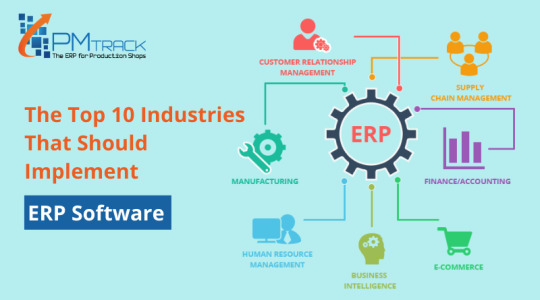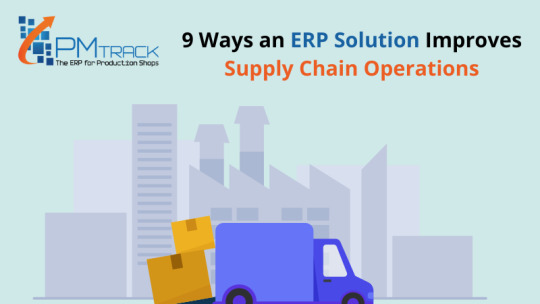#AdvancedERPsystems
Explore tagged Tumblr posts
Link

#Supplychainmanagement#InternetofThings#EnterpriseResourcePlanningsoftware#ERPSoftware#supplychainmanagementprocesses#AdvancedERPsystems#ERPsystem
0 notes
Text
The Top 10 Industries That Should Implement ERP Software
Enterprise Resource Planning (ERP) has a lot of potential for helping businesses improve their performance and streamline their operations. It organises the company’s data and aids in day-to-day operations management. It’s similar to juggling macro and micro plans.
An ERP system can provide a variety of operational, strategic, and organisational advantages. Many ERP software companies in Pune are thriving due to their ability to assist a variety of businesses. Let’s take a look at how it can benefit a business.

Why ERP for Industries?
ERP is a central business framework that is fuelled by market characteristics like widespread digital acceptance, booming global trade, and large volumes of data that must be monitored, maintained, and analysed. Industries can benefit from enhanced business reporting, improved inventory costs, increased cash flow, cost savings, and improved customer service by implementing ERP systems. The massive success of ERP software across various industries demonstrates the global demand.
Take a look at the Best 10 Industries where an ERP System is critical:1.ERP FOR MANUFACTURING
Because the manufacturing industry is so dynamic and competitive, it’s critical for businesses to have an integrated solution that can boost productivity, lower costs, and boost revenue and profitability. Allow the company to make precise, well-informed, and strategic decisions, above all.
The following are some of the benefits of manufacturing ERP software:
ERP in the manufacturing industry has potential patterns of 50 percent quick usage, 46 percent increased functionality, and 43 percent total cost of ownership (TCO).
66 percent of organisations have experienced operational disruptions during ERP implementation.
The top three reasons for ERP programme implementation are: First, increasing the company’s efficiency (64 per cent). Second, for the company’s growth (57%) and third, for the reduction of working capital (57 per cent).
2.ERP FOR EDUCATION
The replacement of older legacy systems with a unified ERP results in a rapid and quantifiable change in the administration process. The programme offers a variety of resources to help modernise the campus, as well as improve student enrolment practises, lecture sessions, classes, the library, and customer service.
The educational ERP system automates and streamlines all processes within the university’s boundaries to greatly improve the efficiency of allocating and operating academic resources.
3.ERP FOR HEALTHCARE
ERP for healthcare is a technical programme made up of modules that track data and facilitate collaboration between departments within a company. Employees are able to work more efficiently as a result, improving performance and productivity. Furthermore, using hospital management ERP systems improves the speed with which health care services are delivered both internally and externally
4.ERP FOR RETAIL
Retail is nowadays one of the fastest-growing industries on the planet. However, as the market grows, so do the difficulties in managing it. The retail sector is made up of many sub-sectors, all of which must be managed effectively in order to maintain or increase profits. Fortunately, retail ERP may be the answer for the retail industry.
5.ERP FOR CONSTRUCTION
Construction ERP software is a business solution that provides effective analytics by combining data from various construction processes such as accounting/financial management, contract management, equipment/inventory management, human resource management, Customer Relationship Management (CRM), scheduling, and submissions.
6.ERP FOR GOVERNMENT SECTOR
Any useful ERP platform must include comprehensive accounting, warehousing, inventory, and logistical components. However, the implementation of more specialised criteria in ERP in the government sector improves these essential elements for a private sector ERP.
7.ERP FOR AUTOMOTIVE INDUSTRY
Automotive ERP offers a broad range of strong and agile business management skills that can effectively handle and integrate each department of an organisation to ensure smooth information flow. Automotive ERP enables workers to work with confidence while reducing errors, allowing them to meet project deadlines and complete jobs in a systematic manner.
8.ERP FOR FOOD INDUSTRY
The food processing industry is one of the largest sectors in terms of demand, output, and export of food products, and it plays an important role in the economy’s growth. Vegetables, fruits, milk products, mineral water, cocoa products, and other products such as alcoholic beverages, fisheries plantations, meat and poultry are all part of India’s food processing industry.
Benefits of ERP for food industry are–
Better quality control at various stages of the manufacturing process.
It can handle supplier details from start to finish.
It can increase production productivity while lowering costs.
Improving supply chain management methods.
Meet new specifications and roles to meet the organization’s needs.
Accounting can handle a wide range of sales and transactions.
9.ERP FOR OIL AND GAS
India is the world’s third-largest oil and gas consumer, accounting for more than a third of the country’s total energy consumption. As a result, the risks associated with multi-geographic locations are certain to cost any oil and gas company money.
Advantages of ERP for Oil and Gas are:
Property control
Content and inventory control
Document handling
Data control
Real-time visibility into main processes
Process quality improvement
10.ERP FOR REAL ESTATE
In simple terms, with the aid of the latest technologies, ERP software incorporates, streamlines, and automates all business processes such as sales, HR, procurement, inventory, etc.It provides useful and relevant information with the goal of increasing revenue and lowering operating costs.
CONCLUSION
Many ERP projects today are far more competitive than they were previously. With the vast array of cloud software available today. Along with the previously mentioned ERP software benefits, ERP is undeniably important.
Tasks benefiting from ERP system include–
Sales forecasting, which allows inventory optimization?
The collection of relevant data to provide a chronological history of every transaction in every field of service.
Order tracking from acceptance to fulfilment
Managing revenue from invoice to cash receipt
Matching sales orders, inventory receipts, and costs (what the vendor invoiced)
You must leverage your operating system in order to expand your business. PMTRACK ERP, a Pune-based ERP software company, offers ERP solutions for a variety of businesses and industries. Our systems are built on cutting-edge technological solutions to give you an advantage in your business.
Contact our team for ERP related queries.
#ERPsystems#ERPsolutions#PMTRACKERPERP#ImplementinganERPsolution#erpsystem#AdvancedERPsystems#erp for manufacturing
1 note
·
View note
Text
9 Ways an ERP Solution Improves Supply Chain Operations
Plastic products are always in high demand, and these industries must deliver large quantities of their products. Maintaining heavy machinery,
The distribution and manufacturing industries are constantly being disrupted by digital transformation, putting pressure on organizations to find advanced solutions in order to stay on top of their daily business processes and ahead of their competition. Predictive analytics and the Internet of Things (IoT) have transformed how businesses manage their supply chains And the changes are just getting started.
Supply chain management is critical to an organization’s overall success. Many manufacturers, for example, rely on vendors to provide them with the right type and number of resources at the right time to keep production moving along as planned. However, according to a recent State of Manufacturing report, “97 percent of respondents report that supply chain management consumes a significant amount of employee time.” That being said, if not managed efficiently, supply chain management can be a time-consuming process – just consider the reduced productivity, cause of delays, impacted quality, and unnecessary expenses and profit losses.

Let’s take a step back and consider your organization. Where do you see your company in a year’s time?
Are you benefiting from increased revenue and efficiency as a result of a cutting-edge supply chain, or are you struggling to make ends meet with legacy systems? This is where modern Enterprise Resource Planning (ERP) software can take your company to the next level – by simplifying and optimizing your supply chain management processes for smoother and more profitable outcomes.
Here are nine ways an ERP solution improves supply chain operations:
Automate Purchasing Process
Keeping a close eye on inventory is critical to avoiding excess or shrinkage, but this monitoring takes time. Advanced ERP systems with supply chain management capabilities can automate this process. When inventory levels fall below a certain threshold, the user is notified. This allows you to stay informed about the need to replenish stock and place orders with vendors accordingly.
Greater Data Insight
The health of a supply chain is heavily reliant on timely and accurate information. A modern ERP system can store a massive amount of real-time data about inventory, purchasing, selling, financial accounting, employees, and other core business functions. The software also provides users with continuous access to reports, resulting in greater insight into the operations and making supply-demand management much easier.
Streamline Core Functions
ERP software is comprehensive management software that integrates and manages various business operations in a supply chain, such as HR, finance, management, and sales, through a single system. This reduces manual paperwork and improves data visibility across the enterprise. Furthermore, the system enables automation, significantly reducing processing and administration-related wait times in the supply chain.
Establish Process Standardization
A standardized process is essential for the success of any supply chain strategy. An ERP solution aids in the development of this consistency across teams in single and multiple locations. This improves overall system efficiency, process accuracy and teamwork, and reduces errors caused by miscommunication.
Increase Transparency
Implementing an ERP solution provides management with a consolidated view of all aspects of supply chain operations. It provides accurate, relevant, and up-to-date information about a shipment in transit, where it is, and when it will arrive at the warehouse. Additionally, employees in the stores and warehouses can have role-based access to this knowledge, ensuring that consistent and accurate information is shared with all relevant people throughout the organization.
Real-Time Inventory Management
Inventory is an essential component of any supply chain setup. Proper management of it can reduce costs while increasing the business’s turnover.
Inventory is traditionally captured using spreadsheets and hand-checked lists. This falls short in terms of providing error-free tracking and up-to-date data. Modern ERP software, on the other hand, includes features that allow for real-time visibility of exact inventory levels. As a result, the supply chain operates at peak efficiency, with lower overhead costs and fewer order fulfillment communication errors.
Decrease Delay
An ERP system is a centralized repository for all information. As a result, the tool provides businesses with greater data transparency and enables them to efficiently allocate resources such as material, personnel, and machines early in the planning process. It allows for better coordinated and executed activities, resulting in on-time delivery throughout the supply chain.
Raise Cost Awareness
Variable costs occur at every stage of the supply chain. Intelligent ERP systems can generate more realistic cost projections by leveraging supply and demand data. This raises cost awareness among managers, allowing them to identify and reduce uncontrollable factors that incur additional expenses, optimise processes, and reduce operational costs.
Upgrade Returns Management
Supply chain processes dealing with returned goods and backorder processing are just as important for logistics companies as shipping products to customers. Returns management is simplified by effective ERP solutions. They enable businesses to have better control over returned products by redoing each process, such as inspection, quality control, packaging, and shelving. A better return management system can help businesses reduce waste and improve backorder processing consistency.
You should now understand how an ERP system can help your supply chain operations. PMTRACK ERP ERP offers ground-breaking features and unrivalled mobility. Click here to schedule a demo or consultation to learn more about how these work.
#Supplychainmanagement#InternetofThings#EnterpriseResourcePlanningsoftware#ERPSoftware#AdvancedERPsystems#supplychainmanagementprocesses#ERPsystem#ImplementinganERPsolution#ERPsystems
0 notes